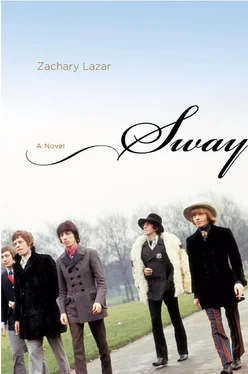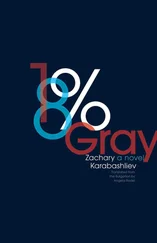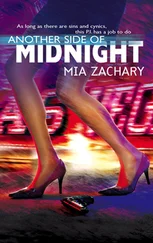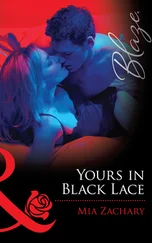Q: Do you believe in God?
JOHN LENNON: Yes, I believe that God is like a powerhouse, like where you keep electricity, like a power station. And that he’s the supreme power, and that he’s neither good nor bad, left, right, black or white. He just is. And we tap that source of power and make of it what we will. Just as electricity can kill people in a chair, or you can light a room with it.
— from a press conference given in Montreal, December 1969
OVER THE YEARS,Anita kept in touch with Anger sporadically. She had put some money into his last film, in the seventies, but he wasn’t easy to be with and so for periods of time she would let the friendship lapse. The last time she saw him was five years ago, when she was in Los Angeles. His apartment was over a dry cleaner in a two-story stucco building in the run-down neighborhood of Echo Park. Some boy let her in. He didn’t introduce himself, and after answering the door he disappeared into another room. It was very dim inside, the curtains drawn, the walls painted a harsh red, the ceiling a glossy black. All of it was lit by old lamps that cast a pale bronze light that would have been the same shade day or night.
Anger was sitting in a chair in the living room, his legs crossed. He wore a black suit and black police shoes. He must have been at least seventy, she thought. There was a thin trace of eyeliner around his eyes.
“Hello, Kenneth,” she said.
She bent over and gave him an awkward sort of half hug, more a patting of the shoulders, and he felt resistant and dry. He looked down at his hands. Beside his chair was a Japanese folding screen and a nightstand cluttered with plastic cups.
“I was expecting you a little later,” he said. He turned away. “But you’re here now.”
“Yes, I’m here now.”
“It’s been a long time.”
She sat down and put her bag on the floor. The room was decorated with old Hollywood memorabilia: pictures of stars from the silent era, Day-Glo posters from the thirties and forties, a pair of brocade curtains with gold tassels. There was a still from Anger’s own film, Inauguration of the Pleasure Dome , which showed a close-up of a woman’s face, lit by a pink light, her red hair cut short like a man’s. Jezebel, Anita remembered. The Whore of Babylon. It was such a long time since she’d last seen the image, more than thirty years.
“Would you like some tea or something?” Anger asked.
“No, thanks.”
“The host is supposed to offer the guest something to drink. It’s a gesture of hospitality.”
“I’ll have some tea, then. Whatever you want.”
The room had a museum stillness when he went into the kitchen. Everything was immaculately silent, watchful. He came back with the tea on a tray: a blue and white ceramic pot, two bright green cups without handles. The cups were ornamented with tiny white and black cranes. In the dimness of the living room, they almost glowed.
She told him she had moved back to London, back to Chelsea. She hadn’t seen Keith in a long time. They had split up many years ago. She was glad to be back in London, though. New York had never felt like home.
“And what about you?” she asked.
“I’ve been here.”
“For how long?”
“Long enough. I’ve been trying to work again. There’s not much to show for it yet.”
He told her he’d moved back to L.A. at the end of the nineties. When he’d lived in New York, he’d been badly mugged several times. It was the crack years, and he’d lived through all that in East Harlem, 110th Street, in two rooms with sealed windows. It was a different city then. He’d been glad to get out. They talked about New York for a while: the way it had changed, both of them saying disparaging things that they didn’t really believe. Overhanging it all was the awareness that in the years they’d both lived there, probably ten years, they had never seen each other at all.
She looked around at the room, at the images of Valentino, the gaudy illustrations of science-fiction characters. There was nothing you could say about the past that didn’t ring false, she thought. She didn’t feel regret or nostalgia about it. Mostly she was happy that things were less urgent now, less intense.
“You’re one of those people I was always curious about,” she said. “Why you disappeared. Why you stopped doing films.”
“There’s nothing to know.”
“You called me a self-absorbed bitch in one of your interviews. I read those things.”
“I say a lot of things.”
“We weren’t thinking, most of the time you knew us. You never really understood that, how little thinking we were doing.”
“I thought you were beyond thinking. I thought you were interesting to watch. I just got tired of it. Struggling, I mean. The money. Thinking it was important to make films.”
He closed his eyes for a moment, then he raised them, looking at her with a slightly hostile appraisal. “We’re all still alive,” he said. “That’s the surprise. That was the one thing the world was always counting on, that we would all just die.”
Her eyes fell again on the picture of the woman with the short red hair. The image had been made decades ago, and yet even now the way the woman looked was daring. If she were alive at all, she would be in her seventies or eighties. Probably she was dead. Time — it had become a big subject for Keith and Mick, a vein of pathos in their last work that was any good. For a long period of her life, she’d had no sense of it — it had had no power to scare her. Later it had seemed that time went back so far that nothing could ever last long enough to matter very much. She would think of geologic time, or the time reckoned by astronomers. But it was better not to think about time at all.
“You’ve been feeling bored,” he said. “That’s why you came here.”
“No, not really. Things have been going well.”
“Wondering what the point of it all is. Wanting to stir up the old ghosts.”
“They’re still there. It’s just that there’s no point in talking about them anymore.”
He bent down to sip his tea, showing the crown of his head. She saw the tattoos on his wrist, the dark ink mottled and slightly faded. It occurred to her, as it had often occurred to her in the past, that the way he looked and acted was a pose, a kind of private joke that kept him at a distance from the world. But it was a long time to hold such a pose. Surrounded by his movie props, he seemed more than ever like someone she would never understand. The room was thick with his past, an agglomeration of dust and souvenirs. It was hard to imagine him leaving it.
In the Lucifer film, the sequel to Invocation of My Demon Brother, there is a scene in which a woman who looks just like Anita climbs a mountain in the closing dusk, a full moon overhead, clouds passing in front of it. Ahead of her in the darkness are four torches that lead the way over a narrow suspension bridge that connects two stone cliffs. She crushes a sprig of lilac blossoms in her hand, throws them aside, staggering a little. The path is made of large stone blocks that slant and buckle, leading to the high span of the bridge and the ancient monolith that lies beyond it. Her role is Lilith, goddess of the unacceptable, the dying, the discarded. She looks like Anita, but in fact she is Marianne, dressed in rock-and-roll clothes: a black fur coat, platform shoes. It is 1972 and, like Anita, Marianne has a heroin addiction that there is no reason to believe she will ever overcome, though she will overcome it, both of them will be all right. She forces herself up the hill, the gray light on her face, her hand at her throat, head down.
Читать дальше












